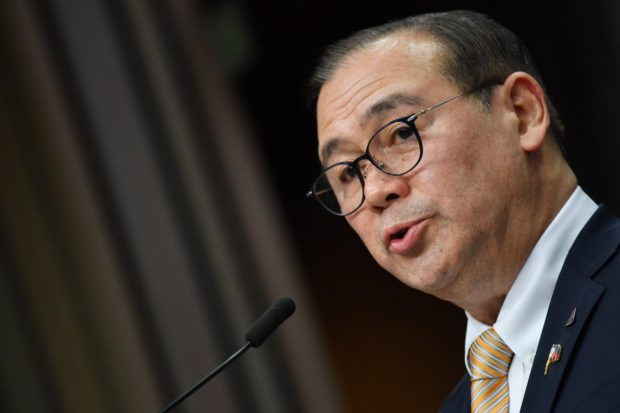MANILA, Philippines — To lift or not to lift the ban on the deployment of health care workers abroad?
That is the question that the Inter-Agency Task Force (IATF) on Emerging Infectious Diseases will tackle in a meeting on Monday.
Cabinet Secretary Karlo Nograles, IATF spokesperson, said the Philippine Overseas Employment Administration (POEA), the Department of Labor and Employment, and other concerned parties had met to discuss the guidelines of the POEA directive amid calls from affected health-care workers to lift the deployment ban.
“Then again, there is a request to have it reviewed by the IATF. So we will discuss this in the meeting [on Monday]. We will publicize whatever the outcome will be,” Nograles said at an online press briefing on Sunday.
Stopped at airport
He made the remarks after many doctors, nurses and other medical professionals were prevented from leaving the airport following the imposition of the ban aimed at giving the national health-care system priority in human resource allocation.
The ban is supposed to remain in place until the Philippines ends its state of emergency and countries that will hire the medical personnel have lifted their coronavirus-related travel restrictions.
Apart from doctors and nurses, also covered by the deployment suspension are medical technologists, clinical analysts, respiratory therapists, pharmacists, laboratory technicians, X-ray/radiology technicians, nursing aides, and medical equipment operators and repairmen.
Foreign Secretary Teodoro Locsin Jr. on Saturday said he would fight the POEA order, calling it an “abomination.”
Many people aired their complaints to Locsin on social media, saying doctors, nurses, other hospital workers leaving for abroad, including those returning to their jobs after a vacation in the country, were barred at Ninoy Aquino International Airport (NAIA) recently.
Senate President Vicente Sotto III said that while he agreed with Locsin in opposing the deployment ban on Filipino medical professionals, it should be a different story for health workers who completed their degrees in public educational institutions.
“All graduates [of] state universities and colleges should at least stay here [in our country] to help and serve for at least two years [before they could work abroad],” Sotto said in a Viber message to the Inquirer.
Locsin continued his rant against fellow government officials for barring nurses from returning to their jobs abroad.
He supported calls to increase nurses’ pay instead to convince them to stay, as he prepared to battle other Cabinet members in the IATF to overturn the travel ban on health-care workers.
“Right. They just want to feel patriotic. At the nurses’ expense,” Locsin tweeted on Sunday, in reaction to a TV host question whether the government would hire all the affected nurses.
“Which hospitals are taking in the nurses banned from their existing contracts abroad?” Locsin went on.
The foreign secretary said the pay of nurses should be raised so they would stay.
Sanctity of contracts
Locsin also noted that the IATF-imposed ban violated the nurses’ right to travel and the sanctity of contracts.
POEA Administrator Bernard Olalia, in a televised interview, said that $200 would be given to each health-care worker who will not be able to leave the country because of the deployment ban.
“If they ever decide to get temporary employment while the temporary ban is imposed, we have already coordinated with the Department of Health (DOH). [The DOH] has a hiring process for [these workers] to be able to work during the temporary suspension,” Olalia said.
Asked to comment on the $200 being too small compared with the salaries of the affected health workers abroad, he explained: “Our financial assistance may be small but this is only temporary in nature. We do not know if in the next couple of weeks, [the suspension] may already be lifted.”
Citing a report from the POEA labor assistance counter at Naia, Olalia said about two dozen health workers bound for the United Kingdom were recently barred from leaving the country.
“More than 20. Apart from the ‘balik manggagawa,’ or returning health workers, we also have the new hires, the direct hires and the government-to-government hires,’’ he said.
Olalia said the temporary suspension of deployment was in response to the national state of emergency declared by President Duterte due to the COVID-19 pandemic.
“This measure is also in support of the provision of the Bayanihan to Heal as One Act in order to have our health workers available for manpower because of the dwindling stocks that we have now, considering the doctors and nurses that are being quarantined in our medical facilities,” Olalia said.
Nurse shortage
Anakalusugan Rep. Michael Defensor said the country could face a shortage of nurses because demand for them in rich countries would go up in the aftermath of the pandemic.
In a statement, Defensor, chair of the House public accounts panel and a vice chair of the health committee, said Congress might have to double the monthly starting pay of nurses to P60,000 to encourage them to stay.
At present, he said, nurses in government hospitals receive a starting monthly pay of P32,053, which will be increased every year until it reaches P36,619 by January 2023 under the new salary standardization law for civil servants.
—WITH REPORTS FROM DJ YAP AND MARLON RAMOS


